This article was co-authored by Clinton M. Sandvick, JD, PhD. Clinton M. Sandvick worked as a civil litigator in California for over 7 years. He received his JD from the University of Wisconsin-Madison in 1998 and his PhD in American History from the University of Oregon in 2013.
There are 10 references cited in this article, which can be found at the bottom of the page.
This article has been viewed 193,181 times.
A DD214 is known as a Report of Separation from Military Service and provides information such as dates of service, type of discharge, awards, GI Bill benefits, and any disciplinary actions. Upon discharge, all service members in all branches of military service receive a Report of Separation. You can request a DD214 in a number of ways, including online, in-person, or by a hardcopy written request. If you are an active service member or a veteran receiving veteran benefits, you should request your DD214 through the Veteran Affairs and Department of Defense. You can also hire an independent researcher to locate the records for you.
Steps
Making an Online Request for Veteran Records
-
1Meet online requirements. To make an online request for a service person’s DD214, you must be either a veteran requesting your own records or a deceased veteran’s next of kin, including:
- The surviving spouse who has not remarried.
- The veteran’s father or mother.
- The veteran’s children.
- The veteran’s siblings.
-
2Use the eVetRecs online system. You can begin the online request process by accessing the veteran’s online record request system (eVetRecs) at https://www.archives.gov/veterans/military-service-records/index.html and clicking on the “Submit your request ONLINE with eVetRecs” hyperlink.Advertisement
-
3Provide identifying information. Once you select the hyperlink, you will be redirected to a page asking for identifying information. You can provide your answers by selecting the appropriate response from the dropdown menus. The information requested includes:
- Are you the :? Your answer can be next of kin of deceased veteran or veteran.
- What is your relationship to the deceased veteran? If you chose veteran responding to the first question, the answer will pre-fill as “not applicable.” If you chose next of kin, you will be given the following options: un-remarried surviving spouse; father; mother; son, daughter, sister, brother.
- Are you seeking information concerning:? You can answer either “former military service” or “current military service.”
- If you meet all the requirements above, the system will give you the option to continue. If you do not meet the requirements, will be instructed to complete form SF-180.
- SF-180 is the standard, hard copy form that is used to request military records. You can use this form if you do not meet the requestor requirements for the online system, discussed above, or if you prefer to a paper request form, as discussed below.[1]
-
4Provide service details. After selecting the continue button, you will be prompted with five questions regarding the veteran’s service information. You must provide the following information:
- Veteran’s branch of service.
- Veteran’s service component (either active or reserve).
- Whether the veteran was an officer or enlisted.
- The reason for your request. There is a dropdown menu that gives the following options: benefits; employment; medical; retirement; military awards/decorations; correction of records; personal military history; genealogy; or decline to disclose.
- Lastly, depending on your above choice, you may be prompted to provide additional information.[2]
-
5Provide locator information. After providing general information about the veteran, you will be prompted with a continue button. This will redirect you to another request for information, this time for specific identifying information about the veteran. This information is used by the National Personnel Records Center (NPRC) to locate the DD214. You will be asked to provide the following information:
- Veteran’s full name used while in service.
- Veteran’s social security number and military service number.
- Veteran’s branch of service and approximate dates of service.
- Veteran’s city and state of birth.[3]
-
6Print and sign form. Once you have completed your online request, you must print and sign the request form and submit it by mail or fax.
- If you are submitting your request by mail, send the form to: National Personnel Records Center, Military Personnel Records, 1 Archives Drive, St. Louis, MO 63138.
- You can fax your request to: 314-801-9195.
- If you are requesting records as the next of kin, you are required to provide proof of the veteran’s death such as a death certificate, letter from the funeral home, or a published obituary.[4]
-
7Wait for your records. It may take NPRC anywhere from 10 days to 6 months depending on the complexity of your request.
- You can make a follow-up request after 90 days.
- You can check the status of your request by contacting the NPRC at 314-801-0800.[5]
Requesting Records through the Veteran Affairs and Department of Defense Offices
-
1Request records online. You can only request your DD214 records online through the Veteran Affairs (VA) and Department of Defense (DOD) Offices if you recently left the military, or you are currently receiving veteran benefits. If you are in one of these two categories, you may be able to request your DD214 through the VA and DOD’s eBenefits website. Visit the eBenefits website at: https://www.ebenefits.va.gov/ebenefits-portal/ebenefits.portal.
-
2Register for DEERS. To request your DD 214 online, you must be registered with the Defense Enrollment Eligibility Reporting System.
- The easiest way to determine whether you are enrolled in DEERS is by trying to register for a DS Logon Account (discussed below). If you are unable to register for your DS logon, attempt to register with DEERS by:
- Visiting the following website: https://iris.custhelp.com/app/ask.
- In the question box, type “Not in DEERS.”
- Next, from the dropdown menu “select a topic,” select the “Veteran not in DEERS (Add)” option.
- Next, from the dropdown menu "Select an Inquiry Type?" select “Question.”
- Provide identifying information on the form.
- A VA representative will contact you within a few days.
- You may also call the VA at 800-827-1000, and then choose option 1, then option 7, and then option 0, for assistance.
- In order for the VA to assist you, you must be receiving VA compensation through an electronic funds transfer (EFT).
- The VA will request your checking or savings account number and most recent dollar amount for your EFT to verify tour status.[6]
-
3Request a DS Logon. Once you are registered in DEERS, you can request your DS Logon at a VA Regional Office (VARO), which you can locate at: http://www.benefits.va.gov/benefits/offices.asp. Additionally, you can obtain your DS Logon in the following ways:
- You can enter your Last Name, First Name, Date of Birth and your social security number on the online application: https://myaccess.dmdc.osd.mil/.
- As an active service member, you can use your Common Access Card (CAC) to register for a DS Logon at: https://myaccess.dmdc.osd.mil/identitymanagement/registration.do?execution=e2s1
- As a veteran, you can try to register online at: https://myaccess.dmdc.osd.mil/identitymanagement/registration.do?execution=e6s1. If you do not have a CAC, you will have to prove your identity by calling the VA at 800-827-1000 or visiting a local VARO office.[7]
-
4Log in to eBenefits account. Once you have your DS Logon, you can use that to log in to your eBenefits account. Once you access your account, you can verify, review and print documents from your Military Personnel File, including your form DD214.
- You can log in to eBenefits at: https://www.ebenefits.va.gov/ebenefits/about/feature?feature=military-personnel-file.[8]
Completing a Hardcopy Request for Records
-
1Download and print form SF-180. This form is the standard military request form. Veterans or the next-of-kin of deceased veterans can request form DD214 using SF-180. Additionally, the general public can request records for service persons who served more than 62 years ago. These records are considered archival records and can be requested using form SF-180.[9] You can download the form at: https://www.archives.gov/research/order/standard-form-180.pdf
-
2Complete form SF-180. To complete the form, you will need to print or type the following information in the correct boxes on the form:
- The veteran’s full name used during service.
- The veteran’s social security number, date of birth and place of birth.
- The veteran’s branch(es) of service and whether the service was active, reserve, or the national guard.
- Approximate dates of service.
- Check that you are requesting form DD214.
- Provide the purpose of the request.
- The requester’s name and relationship to veteran.
- Sign and date form.
- Attach any required documents such as proof of veteran’s death.[10]
-
3Return form SF-180. On page 2 of form SF-180, you will find a list of the possible locations of all military records. The locations are organized according to branches of service, separation from service dates, and the location for DD214s. Locate the correct location based on your veteran’s service information and the location of personnel records. You should mail the completed form to that address.[11]
-
4Wait for a response. NPRC can respond to approximately 92% of the requests for separation documents, such as DD214s, within 10 days of receiving the request. However, if you are seeking records that were damaged in the 1973 archival fire, your request could take up to six months.
- You should not send up a follow-up request until after 90 days from your original request as it may delay the processing of your original request.[12]
Visiting the National Archives in Person
-
1Schedule an appointment for a research room. If you want to view a DD214 in person, you can visit the National Personnel Records Center in St. Louis, Missouri. The NPRC maintains military records for discharged and deceased veterans who served from World War I and until the end of the 20th century. The records can be accessed by a veteran desiring to review his or her own record, the veteran’s next of kin, or individuals with written consent from the veteran or his or her next of kin. You can schedule an appointment in the following ways:
- For military personnel records from before 1955, either e-mail stlarr.archives@nara.gov or call 314-801-0850.
- For military personnel records from after 1954, call 314-801-0775.
- For all military personnel record requests, you must provide the following information: name; phone number; desired date and time for appointment; whether you want to bring electronic equipment; specific information about the veteran and the records you are requesting.
-
2Complete researcher forms. Anyone visiting the National Archives and reviewing materials must review and/or complete the following:
- A Research Application located at: https://www.archives.gov/st-louis/archival-programs/na-14003-researcher-application.pdf
- Review the Research Room procedures.[13]
- Once you have your appointment, you should contact the Research Room by phone at 314-801-0850, and ask where and when to submit your forms. You must submit your forms before your appointment.[14]
-
3View records. Once you have submitted all of your information, the NPRC will attempt to retrieve your requested documents and have them ready for your review during your appointment. There are some reasons why the NPRC may not be able to provide you with your records. These reasons include:
- The record does not exist.
- The record was damaged in the 1973 fire and may not be available because of fire damage.
- The record is extremely fragile or damaged.
- The record is inaccessible to the public, and you do not meet the necessary kinship requirements to view the document.[15]
Hiring an Independent Researcher
-
1Review the National Archives list of researchers. One of the fastest ways to locate the desired DD214 is by hiring a very familiar independent researcher with the National Archives and NPRC. The National Archives maintains a list of military record researchers at: https://www.archives.gov/research/hire-help/topics.html?topic=military.
-
2Contact a researcher. Each researcher lists his or her specialty. Once you choose a researcher, email him or her the basic information about the type of documents you are seeking and ask for a quote as to the cost of his or her services.
- You can contact multiple researchers and compare price quotes.
- Depending on the cost of the researcher’s time, you can choose to hire the researcher or seek the DD214 yourself.[16]
-
3Discuss the scope of services. Depending on the services that you request, an experienced and qualified researcher can go to the physical location where your record is being kept and obtain a copy of the document. You will need to provide the researcher with a written authorization allowing him or her to access your information.
- Typically, a researcher can gain access to the material more quickly than if you request the information through the NPRC.
- A researcher will assist you in completing your paperwork and physically retrieve the documents for you.
- You should be wary of any research companies that only have you fill in the DD214 paperwork and then faxes the request in for you.[17]
-
4Hire a researcher. If you choose to hire an independent researcher, send the researcher an email that includes the information that you are seeking, the services for which you hired him or her and the agreed upon fee. You should also request that the researcher confirm receipt of your email and that he or she agrees to keep confidential any information that is not publicly available.
References
- ↑ https://www.archives.gov/research/order/standard-form-180.pdf
- ↑ https://www.archives.gov/veterans/military-service-records/index.html
- ↑ https://www.archives.gov/veterans/military-service-records/index.html
- ↑ https://www.archives.gov/veterans/military-service-records/index.html
- ↑ https://www.archives.gov/veterans/military-service-records/index.html
- ↑ https://myaccess.dmdc.osd.mil/identitymanagement/registration.do?execution=e1s2
- ↑ https://myaccess.dmdc.osd.mil/identitymanagement/registration.do?execution=e1s2
- ↑ https://www.ebenefits.va.gov/ebenefits/about/feature?feature=military-personnel-file
- ↑ http://www.archives.gov/veterans/military-service-records/about-service-records.html
- ↑ https://www.archives.gov/research/order/standard-form-180.pdf
- ↑ https://www.archives.gov/veterans/military-service-records/standard-form-180.html#sf
- ↑ http://www.archives.gov/veterans/military-service-records/standard-form-180.html
- ↑ https://www.archives.gov/st-louis/archival-programs/archival-research-room.html; https://www.archives.gov/st-louis/military-personnel/public/general-public.html
- ↑ https://www.archives.gov/st-louis/archival-programs/archival-research-room.html
- ↑ https://www.archives.gov/st-louis/archival-programs/archival-research-room.html
- ↑ http://www.dd214.us/methods.html
- ↑ http://www.dd214.us/methods.html
About This Article
A DD214 is a report of separation from the U.S. military, including your dates of service, type of discharge, awards, and any disciplinary actions. You should automatically receive your Report of Separation when you’re discharged from service. However, if you need a copy of your report or you're the next of kin for a deceased veteran, fill out an online form on the veteran’s online record request system. You’ll need to know your or your family member’s branch, service component, social security number, and military service number. If you haven’t heard anything back after 90 days, send a follow-up request. For more tips from our Legal co-author, including how to find a DD214 in the National Personnel Record Center, read on!

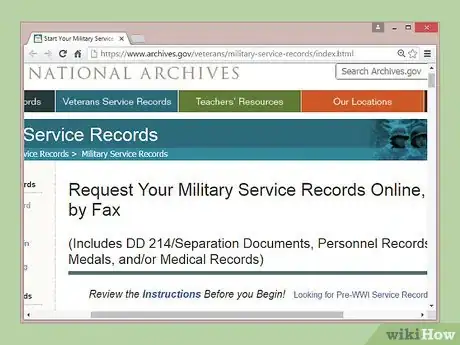
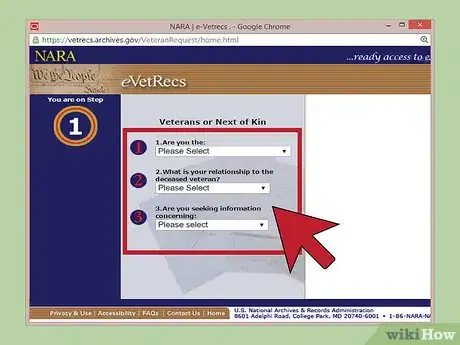
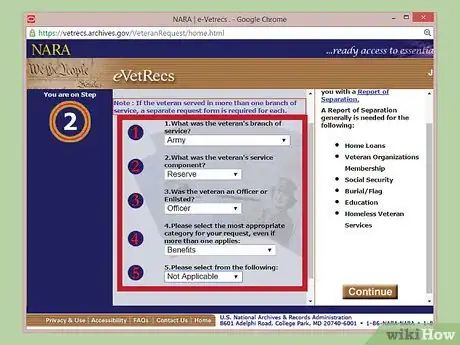


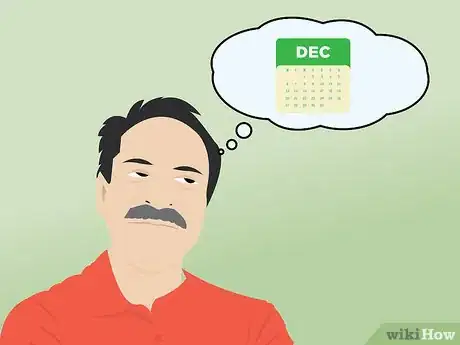

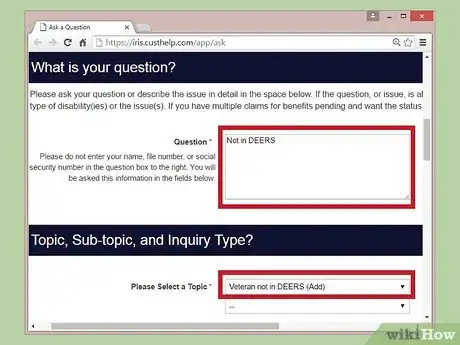
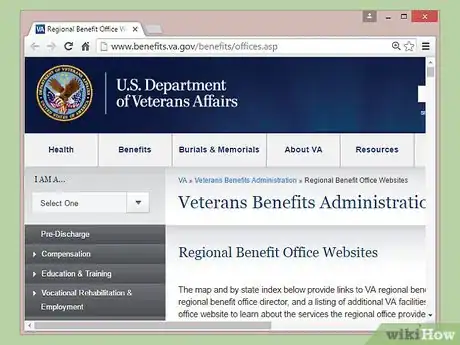
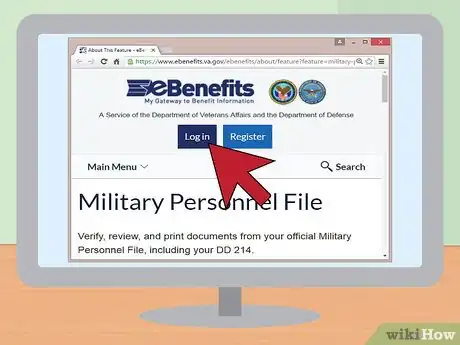

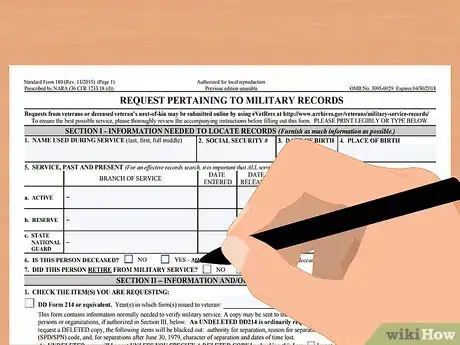
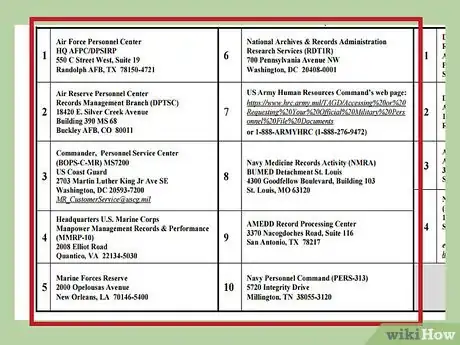


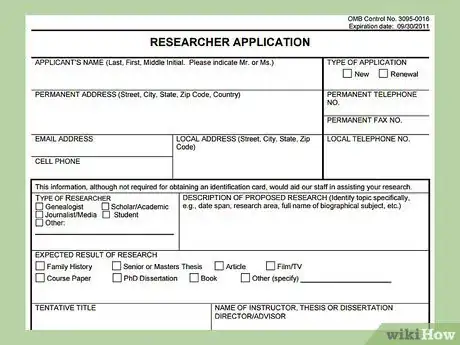
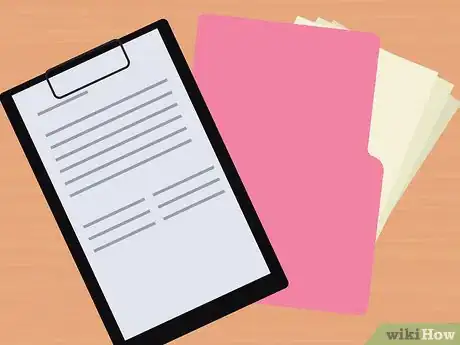
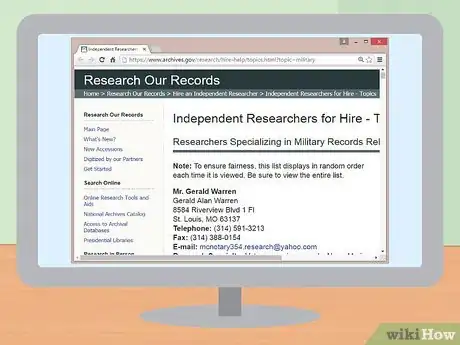


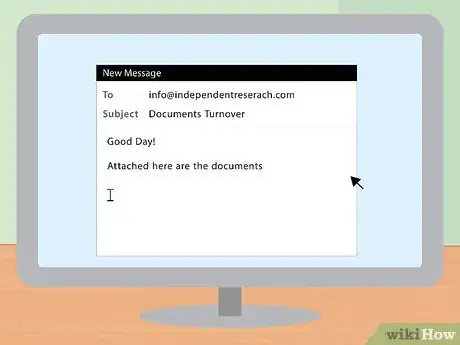





-Step-10-Version-3.webp)





















































